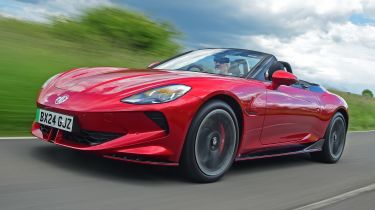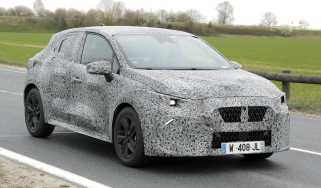MG Cyberster review
The MG Cyberster brings strong performance and eye-catching design, but is more open-topped grand tourer than MGB-style sports car

Is the MG Cyberster a good car?
If you're looking for an electric Mazda MX-5, the MG Cyberster isn't it. The spirit of MG's classic sports cars is difficult to emulate when you add electrification to the mix, so MG has steered the Cyberster away from being an MGB copy and placed a focus on grand touring. The ride is smooth, it's searingly quick in a straight line and those doors will be a talking point every time you use them, but as a driver's car, the Cyberster lacks that sense of occasion that the best open-topped GTs deliver.
The arrival of the MG Cyberster marks a significant moment in the story of the Chinese-owned brand. With the old Morris Garages MG having a rich history of sports cars, any flagship performance car from the new MG will have a large weight of expectation placed upon it, because not only will it need to attract potential buyers, but it will need to please the enthusiasts, too.
| Key specs | |
| Fuel type | Electric |
| Body style | Two-seater roadster |
| Powertrain |
1x e-motor, rear-wheel drive77kWh battery 2x e-motors, all-wheel drive 77kWh battery |
| Safety | Not tested by Euro NCAP |
| Warranty | 7yrs, 80,000 miles |
How much does the MG Cyberster cost?
For the style and performance on offer, plus the theatre of those scissor doors, the MG Cyberster is good value for money. Nevertheless, it does mark uncharted territory for MG in terms of pricing strategy.
The range kicks off from around £55,000, for the Trophy single-motor version, with a £5,000 step-up required to secure the all-wheel drive GT range-topper. That puts it in the same ballpark as the BMW Z4 M40i and Porsche 718 Boxster, but aside from having a folding canvas top, the Cyberster is about as far removed from those two models as it’s possible to be while still being a two-seat roadster.
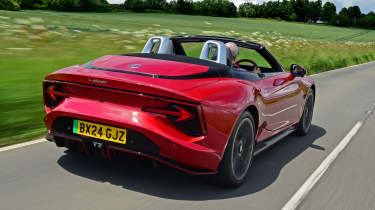
Firstly, it’s an electric car. There’s a 77kWh battery set between the axles and, in the entry model, a rear-mounted electric motor providing 335bhp. The top-spec GT model features an electric motor at each end for four-wheel drive and a total output of 496bhp. That’s a significant 200bhp more than the Boxster delivers, and 160bhp more than the Z4.
Used - available now

2023 Kia
Sportage
36,988 milesAutomaticPetrol1.6L
Cash £22,676
2023 Polestar
2
37,552 milesAutomaticElectric
Cash £19,897
2022 BMW
3 Series Touring
65,529 milesAutomaticDiesel2.0L
Cash £19,997
2021 Mazda
CX-5
38,900 milesAutomaticPetrol2.0L
Cash £19,497Each powertrain option has a single designated trim level; Trophy for the RWD car, and GT for the more powerful model. But, aside from the extra shove on offer, and a set of 20-inch alloys, the GT doesn’t bring any extra equipment over the entry car.
Electric motors, performance & drive
As with many modern EVs, the Cyberster turns on as soon as you get behind the wheel, so all you have to do is select drive and you’re ready to roll - there’s not even a handbrake to select, it simply engages when you select Park. Setting off delivers the first strange sensation of driving an open-topped EV: virtually silent running. MG has incorporated a couple of synthesised sounds, one futuristic, the other offering a low-end buzz reminiscent of an MGB’s, but total silence is also offered.
And this silence offers an insight into the Cyberster’s character, because it delivers fantastic refinement, not just at low speeds, but through the entire driving spectrum. The suspension has a lot of weight to deal with, so the damping has been set up to absorb bumps, which it does so with ease. Combine this with the effortless power that’s on offer, and the Cyberster offers the sensation of an old-school grand tourer.
The electric powertrain offers instant responses, but different driving modes mean you can tailor its character to your needs. In reality, the standard setting is good enough, but if you want to be a winner at the traffic-light grand prix - or scare a passenger - there’s a Super Sport mode that unleashes full power. Launch control is also included - simply press the brake pedal with your left foot, put the accelerator to the floor, release the brake, and away the Cyberster shoots forwards. It’s a typical EV in that regard, with the added sensation of the wind in your hair with the roof down.
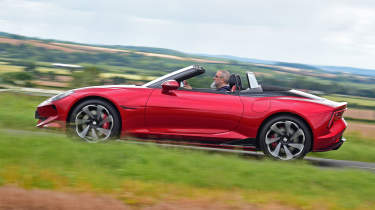
Unfortunately the Cyberster’s weight counts against it on twisty roads. The steering is light and grip is plentiful, but over the lumps and bumps of UK B-roads, the suspension struggles to keep the car tied down. The chassis bobs around over rough surfaces, while there’s plenty of pitch under acceleration and braking.
The brakes themselves feel as if they struggle to scrub off speed as quickly as you can pile it on, while the car’s grand touring nature means that you’re more likely to use the car’s regenerative braking to scrub your speed. The energy recovery system has three levels of assistance - coasting, strong and a one-pedal setting – while one of the paddles behind the wheel adjusts this on the fly.
Lean into the Cyberster’s character, and it offers a plush ride and excellent comfort. With the roof up, there’s not much noise to be heard, although at motorway speeds there’s more tyre roar, while our car suffered from some wind noise around the doors when cruising at motorway speeds. But at urban speeds the Cyberster is all but silent.
Put the roof down, and the silence offers a unique sensation in a sports car such as this. Increase your pace, and the Cyberster does suffer from wind buffeting from around 50mph and above.
| Model | Power | 0-62mph | Top speed |
| MG Cyberster Trophy | 335bhp | 5.0 seconds | 121mph |
| MG Cyberster GT | 496bhp | 3.2 seconds | 125mph |
0-62mph acceleration and top speed
There’s plenty of straight line performance on offer no matter which model you go for. The Cyberster Trophy provides 475Nm of instantly available torque to help it get from 0-62mph in 5.0 seconds flat, while upgrading to the all-wheel drive GT brings a phenomenal 725Nm, and a supercar-baiting 3.2-second sprint time.
Range, charging and running costs
You shouldn't have any worries planning a longer road trip in the Cyberster. MG claims the rear-wheel drive Trophy version is capable of covering up to 316 miles between battery tops (WLTP combined cycle), while if you opt for the extra reassurance of the-wheel drive GT then you’ll need to sacrifice 40 miles of range compared with the entry car.
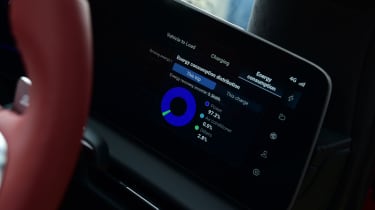
The Cyberster’s 144kW maximum charging rate is good, but not outstanding. It means you’ll need around 38 minutes to take the battery from a 10 to 80 per cent charge, while an overnight top up at home (from 10-100 per cent), via a 7kW wallbox, requires 12.5 hours.
| Model | Battery size | Range | Insurance group |
| Cyberster Trophy | 77kWh (74.4kWh useable) | 316 miles | 47 |
| Cyberster GT | 77kWh (74.4kWh useable) | 276 miles | 50 |
Insurance groups
While charging the Cyberster at home can help to dramatically reduce your running costs, there’s no getting away from the fact that it will be expensive to insure. With the Trophy version in group 47, and the GT in the top group 50 rating,
Depreciation
Contrary to reports of some EVs losing a huge chunk of their value in the first few years of ownership, our expert data indicates that the Cyberster should hold onto 59 per cent of its sticker price after three years and 36,000 miles. By way of comparison, the BMW Z4 M40i is at 43-45 per cent over the same period, while the Porsche 718 Boxster is expected to retain somewhere between 52-57 per cent (depending on which version you go for) after 36 months.
To get an accurate valuation for a specific model, check out our valuation tool...
Interior, design and technology
While the Cyberster is big, that two-seat body manages to hide its dimensions well, and the car’s proportions ape those of a front-engined machine, with a long bonnet, a set-back cockpit and short bootlid. From the front, the pointed nose sweeps up and back to create a smooth shape, while the rear end is broken up by a set of fussy LED lights. The big arrows that point in the direction of the indicators look rather comical, although it’s only the outer edges that flash when you’re turning.
The biggest talking point about the exterior is the Cyberster’s scissor doors. Press a button, and electric motors allow them to sweep open vertically, which is bound to draw attention every time you use them. Access to the cabin is simple enough once they’re up (sensors prevent the doors opening if objects or people are too close, and the opening height can be set at different levels) while two big buttons on either side of the roof switch on the centre console are used to close them.
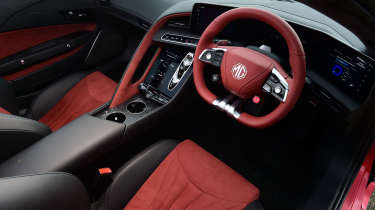
The Cyberster features a canvas folding roof that opens and closes electrically, and it operates separately from the doors, so it can be used when they’re open or closed. The roof takes less than 15 seconds to operate, and can be operated at speeds up to 30mph, too.
From behind the wheel, the Cyberster’s cabin feels roomy for a roadster, with plenty of space for two. However, one tell-tale sign of the car’s electric powertrain is evident as soon as you’re seated. When you climb aboard a Mazda MX-5 or Porsche 718 Boxster, there’s a sensation that your backside is only inches from the road, but in the Cyberster, you sit as tall as you would in a family hatchback. The location of the battery under the floor has dictated this, and while it means it’s easy to get in and out, it detracts from the sense of occasion that a sports car such as this should deliver.
Sat-nav, stereo and infotainment
The overall cabin experience is somewhat of a mixed bag. While space is good, there are some ergonomic flaws to contend with. The triple-screen set-up for the driver features touchscreens on either side, but the steering wheel obscures around a third of the lower corners of the outer displays, while the way the assorted functions are distributed between the screens is confusing. Essential data such as speed, range and navigation info can be shown on the central 10.25-inch screen, while images relayed from the car’s cameras appear on the right-hand screen. But then smartphone info is shown on the left-hand display, which is also where multimedia info is located.
The two outer screens measure seven inches across and are touch-sensitive, but some functions are replicated on the multifunction steering wheel, where extra buttons cycle through different menus. Unfortunately the system isn’t very intuitive to use, although more time with the system might help to unlock its user-friendliness.
To the left of the driver, the centre console has another touchscreen display. This portrait layout features the climate controls and drive settings, but it’s something of a distraction to use while driving - our car also had the habit of beeping when not paying attention to the road ahead, although this happened most times when using the portrait display. And it’s not as if the centre screen is easy to use for a passenger, either, with the large grab handle obscuring the screen.
Boot space, comfort & practicality
| Dimensions | |
| Length | 4,535mm |
| Width | 1,913mm (ex. mirrors) |
| Height | 1,329mm |
| Number of seats | 5 |
| Boot space | 249 litres |
At more than 4.5 metres long and 1.91 metres wide, the Cyberster is bigger than a 911 Turbo, while its gross weight of 2.2 tonnes is around 200kg more than the Porsche’s when fully laden. One benefit of the roadster’s larger size is that there’s plenty of scope for packing. There’s no frunk, but a large open space behind the seats will be big enough for a soft bag or two, while the boot has space for a small suitcase or two - as long as you can fit them in around the charging cables.
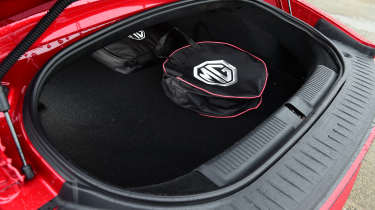
The Cyberster’s seats are comfortable enough; trimmed in a combination of synthetic leather and a suede-effect material. Both have a heating function (as does the steering wheel) and include six-way electrical adjustment with lumbar support. Keyless entry, adaptive cruise control, front and rear parking sensors and a 360-degree parking camera are all standard; adding an extra layer of comfort and convenience.
Reliability and safety
It’s fair to say that the MG brand could do (a lot) better in the eyes of owners who voted in our 2024 Driver Power survey. The manufacturer finished in last place out of 32 car makers, while not one model appeared in the top 50 Best cars to own.
Despite this gloomy feedback, there’s still much to be positive about: the MG HS SUV was the eighth most popular car in the UK through 2024, while the MG3 took our Affordable Car of the Year title, and the ZS compact SUV continues to be a strong seller, too. Hopefully, MG can rectify the issues which are preventing it from receiving more favourable votes.
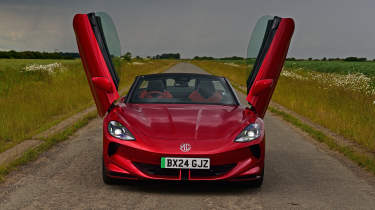
Although the Cyberster hasn’t yet been assessed by industry safety experts, Euro NCAP, it should be a relatively safe car. The MG Pilot system comes as standard across the range and features a host of active safety tech, including Lane Keep Assist, Active Emergency Braking (with cyclist and pedestrian detection), Active Rear Cross Traffic Alert and Blind Spot Detection.
Warranty
The Cyberster comes with a seven-year/80,000-mile warranty, which is a lot better than the standard three-year cover offered by some rivals, and it’s transferable to any future owners.
Servicing
MG recommends a standard servicing interval of every year or 15,000 miles - whichever comes first. Plus, you can choose to take out a MG Service Plan which can be tailored to your predicted mileage, and helps to take the sting out of scheduled maintenance costs.
